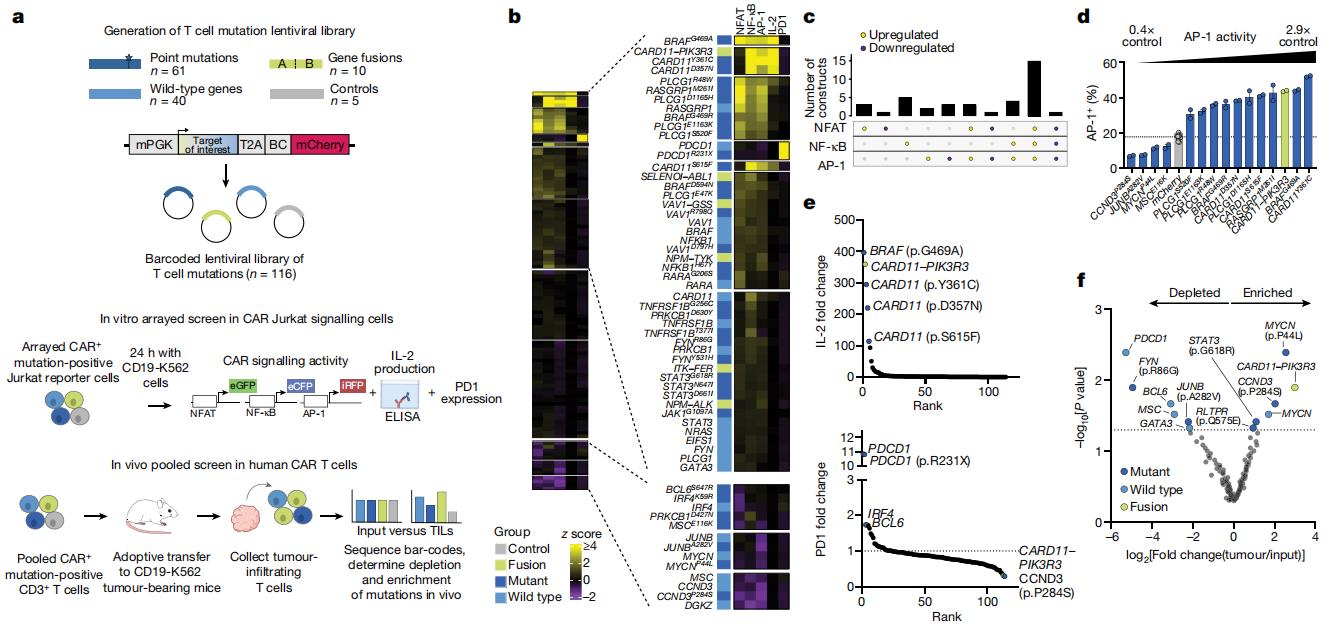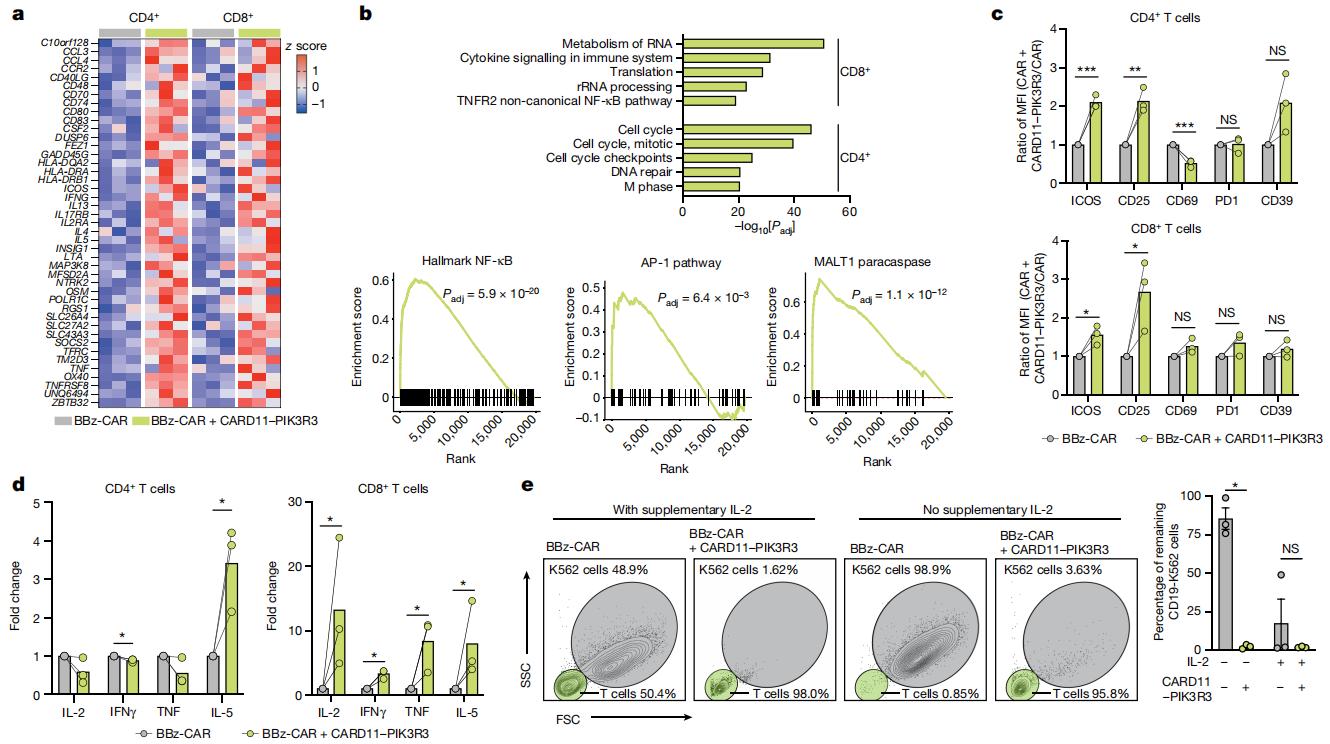Jaehyuk Choi's team at Northwestern University Feinberg School of Medicine and Kole Roybal's team at the University of California, San Francisco published a research paper titled "Naturally occurring T cell mutations enhance engineered T cell therapies" in the journal Nature.
By studying the malignant T cell gene mutations that cause lymphoma and integrating the gene encoding this naturally occurring, unique mutation into CAR-T cells, their ability to kill cancer cells is increased by more than 100 times. Moreover, there are no toxic side effects and cancer-promoting risks, which opens a new door for the therapeutic application of CAR-T cell therapy in solid tumors.
CAR-T cell therapy has revolutionized the treatment landscape of blood cancers. However, in solid tumors and drug-resistant hematological malignancies, this emerging cutting-edge therapy is still limited by multiple factors, including poor persistence in the body, immunosuppressive environmental factors, and T cell exhaustion.
Interestingly, although the artificially modified CAR-T cells have poor ability to continue fighting, the malignant T cells that cause lymphoma can persist in the body. Malignant T cells are likely to have a special genetic mutation that makes them powerful. If this genetic code can be written into CAR-T cells, can cancer be treated? To confirm this idea, the research team screened for adaptive mutations that occur in T cell tumors and generated a gene library containing 71 mutations and 45 wild-type controls. Next, they integrated these mutations into human and mouse T cells, screened and evaluated their effects on T cell phenotypes in vitro and in vivo.

Figure 1. In vitro and in vivo screening identifies T cell mutations that reprogram CAR signalling and functional outputs. (Garcia J, et al., 2024)
The research team discovered a unique gene fusion - a fusion of CARD11 and PIK3R3 - called CARD11-PIK3R3 in CD4+ cutaneous T-cell lymphoma. CAR-T cells carrying this gene mutation significantly increased AP-1 and NF-κB signal transduction, interleukin-2 (IL-2) production, and tumor killing in vitro and in vivo.
| Cat.No. | Product Name | Price |
|---|---|---|
| CSC-DC002366 | Panoply™ Human CARD11 Knockdown Stable Cell Line | Inquiry |
| CSC-SC002366 | Panoply™ Human CARD11 Over-expressing Stable Cell Line | Inquiry |
| AD02983Z | Human CARD11 adenoviral particles | Inquiry |
| LV07896L | human CARD11 (NM_032415) lentivirus particles | Inquiry |
| CDCR041434 | Human CARD11 ORF clone (NM_032415.4) | Inquiry |
| MiUTR1M-02524 | CARD11 miRNA 3'UTR clone | Inquiry |
| MiUTR3H-09048 | CARD11 miRNA 3'UTR clone | Inquiry |
Further studies showed that CARD11-PIK3R3 enhanced the CARD11-BCL10-MALT1 complex signaling pathway in an antigen-dependent manner, promoting the anti-tumor efficacy of CAR-T cells in several tumor models that are insensitive to immunotherapy and having sustained tumor-killing activity.

Figure 2. CARD11-PIK3R3 expression leads to signalling, transcriptional and functional enhancements in primary human CD8+T cells. (Garcia J, et al., 2024)
Not only that, CARD11-PIK3R3 can also significantly reduce the therapeutic dose of CAR-T cells. In conventional CAR-T therapy, millions of CAR-T cells are usually used to treat cancerous mice. But after integrating the CARD11-PIK3R3 gene mutation, only 20,000 new CAR-T cells are enough to eliminate tumors. In other words, CARD11-PIK3R3 increases the ability of CAR-T cells to kill cancer cells 100-fold.
| Cat.No. | Product Name | Price |
|---|---|---|
| CSC-DC011790 | Panoply™ Human PIK3R3 Knockdown Stable Cell Line | Inquiry |
| CSC-RT1425 | Human PIK3R3 Knockout Cell Line-HeLa | Inquiry |
| CSC-SC011790 | Panoply™ Human PIK3R3 Over-expressing Stable Cell Line | Inquiry |
| AD12282Z | Human PIK3R3 adenoviral particles | Inquiry |
| CLKO-1275 | PIK3R3 KO Cell Lysate-HeLa | Inquiry |
Therefore, thanks to such a powerful anti-tumor killing effect, this new technology reduces the need for CAR-T cell dosage and alleviates the requirement for harsh lymphocyte-depleting pretreatment. More importantly, 418 days after injection treatment, CAR-T cells expressing CARD11-PIK3R3 showed no signs of malignant transformation, proving the safety of this new technology in vivo.
All in all, this study published in Nature shows that the genetic mutation naturally occurring in lymphoma, CARD11-PIK3R3, increases the killing effect of CAR-T cells on real tumors by a hundred times. This research result also suggests that rational utilization of naturally occurring genetic mutations may be a new direction for improving T cell immunotherapy.
Reference
Garcia J, et al. Naturally occurring T cell mutations enhance engineered T cell therapies. Nature, 2024: 1-9.

